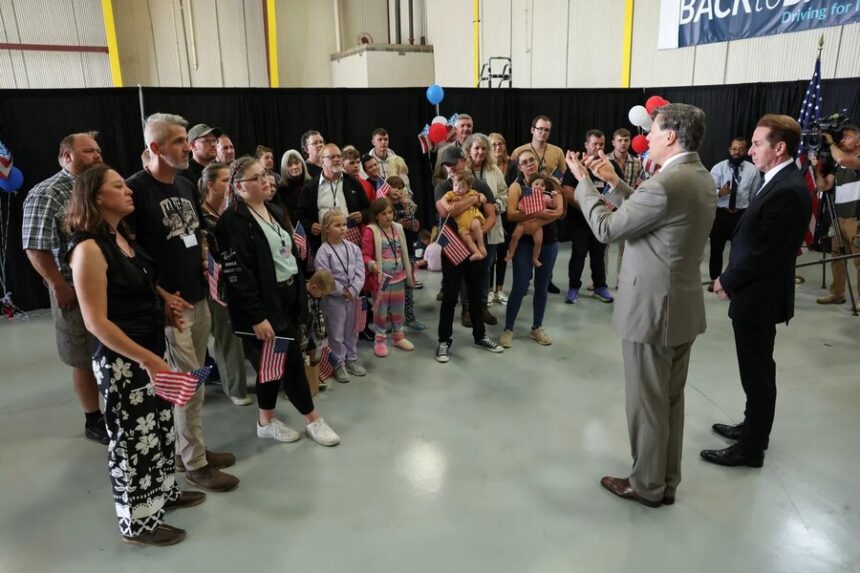The Trump administration’s decision to grant refugee status to 49 white South Africans has ignited a firestorm of political and humanitarian debate. The group arrived at Dulles International Airport on May 12, where they were warmly welcomed by Deputy Secretary of State Chris Landau. The move comes after former President Donald Trump labeled the white minority in South Africa as victims of “genocide” — a claim widely rejected by the South African government and global human rights organizations.
A Politically Charged Welcome
Landau greeted the arrivals with reverence, saying, “Welcome to the United States of America. It is such an honor for us to receive you here today.” He further praised the “long tradition” of the Afrikaner people, referring to their European colonial ancestry, particularly Dutch settlers.
Trump, who had earlier suspended refugee admissions from numerous countries citing national security concerns, described the South African group as victims of targeted violence. “White farmers are being brutally killed,” he claimed during a White House event before the arrivals.
However, Trump’s focus on white South African farmers marks a sharp policy departure from his administration’s broad restrictions on refugees fleeing from regions experiencing active violence and political turmoil, including Haiti, Venezuela, Cuba, and Nicaragua.
Disputed Claims of Genocide
The former president’s use of the term “genocide” to justify the asylum granted to the South Africans has been met with considerable skepticism and backlash.
According to South African President Cyril Ramaphosa, the claim represents a “completely false narrative.” The South African Police Service’s own data supports this assertion, indicating no pattern of racial targeting in farm-related crimes. In fact, despite being 8% of the population, white South Africans represent only 2% of murder victims in the country, a statistic corroborated by international watchdog Genocide Watch.
“Genocide has a very clear definition,” said Mandeep Tiwana of CIVICUS, a South Africa-based human rights organization. “What is happening in South Africa with white South Africans does not fit the definition at all. In fact, white South Africans are a privileged minority.”
The Genocide Convention defines genocide as violence intended to eliminate a group based on race, religion, or nationality — a threshold critics say has not been met in this case.
Land Reform and Historical Context
One of the Trump administration’s justifications for refugee designation was the South African government’s recent land reform policy. President Ramaphosa signed legislation in January allowing for state seizure of land without compensation, aimed at addressing long-standing inequalities rooted in the country’s apartheid past.
Under apartheid, South Africa’s white minority enjoyed disproportionate control over the country’s land and economy. Though apartheid officially ended in 1994, the economic legacy persists — white South Africans still own a majority of the land and maintain a dominant share of national wealth.
Critics argue that citing land reform as persecution overlooks the broader historical context and the policy’s intent to redress structural inequality rather than incite racial retribution.
Accusations of Favoritism and Political Theater
The move has triggered widespread criticism from humanitarian organizations, faith groups, and immigration advocates who accuse the Trump administration of racial favoritism and hypocrisy.
Laura Thompson Osuri, executive director of Homes Without Borders, was among a small group of protesters at the airport. Her sign read, “Afrikaners are not refugees.”
“They’re letting in these Afrikaners as quote, unquote refugees, while tens of thousands…that are actual refugees are not allowed to enter,” Osuri said. “It’s just performative. They’re not fleeing war, violence, or persecution.”
Adding to the backlash, the Episcopal Church’s migration ministry announced it would terminate all refugee resettlement partnerships with the federal government following a request to assist with the Afrikaners’ resettlement.
“It has been painful to watch one group of refugees, selected in a highly unusual manner, receive preferential treatment over many others who have been waiting in refugee camps or dangerous conditions for years,” said Presiding Bishop Sean Rowe in a formal letter.
Elon Musk and Public Perception
Adding to the controversy, Elon Musk — a South African-born billionaire and Trump appointee to the Department of Government Efficiency — has previously echoed claims of discrimination against white South Africans. Though Musk was not present at the airport, his influence has lent visibility to a narrative that many believe distorts the reality on the ground.
What’s Next?
The arrival of the 49 white South Africans is seen by critics as symbolic of broader ideological choices made during Trump’s presidency, where racial identity, political optics, and immigration policy collided.
Human rights observers warn that labeling groups as “refugees” based on disputed claims sets a dangerous precedent, particularly when existing refugee pathways have been shut off for countless others in dire need.
While these individuals are now beginning a new life in the U.S., questions remain: Will more white South Africans follow? And what implications does this case have for the credibility and impartiality of America’s refugee policy moving forward?
Key Takeaways:
- 49 white South Africans arrived in the U.S. on May 12 under refugee status, claiming racial persecution.
- The Trump administration cited “genocide” against white farmers — a claim widely rejected by South Africa and human rights groups.
- Critics say the move undermines the credibility of the refugee system, especially as asylum doors remain closed to others fleeing violence and poverty.
- Land reform in South Africa is cited as a political, not racial, initiative to redress historical injustice.




